Retinal diseases encompass a broad range of conditions that affect the retina, the light-sensitive layer at the back of the eye. These conditions can lead to vision impairment or loss, necessitating prompt diagnosis and treatment. Common retinal diseases include age-related macular degeneration (AMD), diabetic retinopathy, retinal detachment, and retinal vein occlusion. Early detection and appropriate management are crucial to preserving vision.

Book Appointment Download Brochure
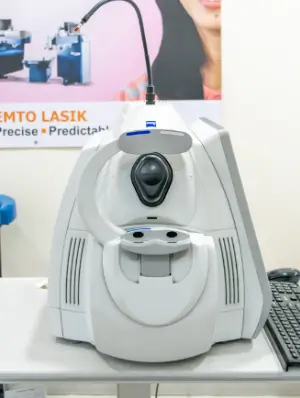
OCT (Optical Coherence Tomography)
Non-invasive imaging for detailed retinal analysis, aiding in diagnosing conditions like macular degeneration and glaucoma.
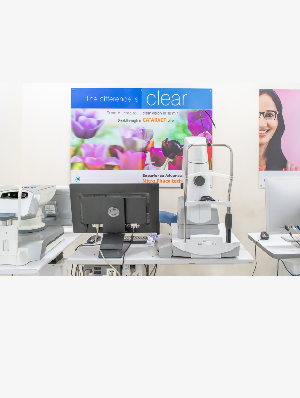
Fundus Photo (Fundus Photography)
Quick and high-resolution images of the retina, helping detect abnormalities and monitor ocular health.

FFA (Fluorescein Angiography)
Evaluates blood flow in the retina and choroid, vital for diagnosing diabetic retinopathy and macular degeneration.
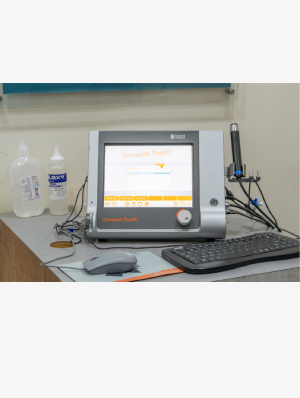
B-scan (B-Scan Ultrasonography)
Ultrasound-based imaging for visualizing eye structures when the view is obstructed, useful in detecting retinal detachments and tumors.
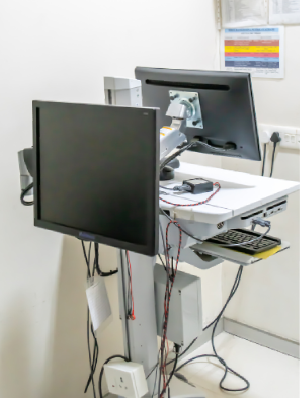
ERG (Electroretinogram)
Measures retina's electrical responses to light, crucial in diagnosing inherited retinal disorders and assessing overall retinal function.
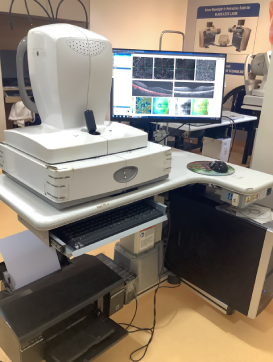
OCT Angiography
OCT angiography is a non-invasive imaging technique that provides high-resolution, 3D visualisation of blood vessels in the retina and choroid.
Treatment options for retinal diseases aim to halt or slow disease progression, preserve, and potentially restore vision. Treatment choice depends on the specific condition, its severity, and the patient's overall health.
Laser surgery is a common treatment for repairing retinal tears or holes. By using a laser to create small burns around the tear, the retina can be sealed to the underlying tissue, reducing the risk of retinal detachment.
This procedure involves using a laser to shrink abnormal blood vessels that may be leaking or at risk of bleeding into the eye. It is commonly used in the treatment of diabetic retinopathy. While effective, it may result in some loss of peripheral or night vision.
Cryopexy is a procedure where intense cold is applied to the eye’s exterior to treat retinal tears. The freezing process induces scarring, which helps secure the retina to the eye wall, preventing further damage.
Pneumatic retinopexy involves injecting a gas bubble into the eye to press the retina back into place. This procedure is often combined with cryopexy or laser photocoagulation to repair retinal detachments.
Scleral buckling is a surgical technique used to repair retinal detachment by sewing a silicone band to the eye's surface. This band indents the eye’s wall, relieving the force pulling on the retina and helping it reattach.
Vitrectomy involves removing the vitreous, the gel-like substance inside the eye, and replacing it with air, gas, or liquid. This procedure is used to treat various conditions, including retinal detachment, diabetic retinopathy, and macular holes.
Intravitreal injections deliver medication directly into the eye’s vitreous cavity. This treatment is effective for conditions such as wet macular degeneration and diabetic retinopathy, helping to reduce abnormal blood vessel growth and leakage.
In cases of severe vision loss or blindness due to certain inherited retinal diseases, a retinal prosthesis may be considered. This involves implanting a tiny electrode chip in the retina, which receives input from a video camera on eyeglasses, allowing the brain to interpret visual information.
Living with retinal disease and vision loss can be challenging. However, there are strategies and tools available to help individuals adapt and maintain their quality of life.
Ensure your eyeglasses or contact lenses prescription is current and at maximum strength. If a new prescription doesn’t improve your vision, consult a low-vision specialist for additional options.
Magnifying devices, such as handheld lenses or specialized glasses, can assist with reading and close-up tasks. Closed-circuit television systems and video magnifiers are also beneficial for those with low vision.
Enhancing the font size and contrast on your computer monitor can make reading easier. Additionally, speech-output systems or voice recognition technology can be invaluable tools.
Talking watches, large-print books, and audiobooks can make daily tasks more manageable. Many tablets and smartphones now offer features specifically designed for individuals with low vision.
Increasing the lighting in your home and using appliances with larger, easy-to-read controls can help reduce the risk of accidents and make daily activities easier.
If driving is no longer safe, consider public transportation, ride-sharing services, or community-based volunteer driving networks
Adjusting to vision loss can be emotionally challenging. Counselling or support groups can provide valuable assistance in coping with these changes. Engaging with supportive friends and family members is also crucial.
When preparing for an appointment with an eye care specialist, it’s important to be well-organized to ensure a comprehensive evaluation.
Your doctor will likely inquire about the onset and progression of your vision problems, whether one or both eyes are affected, and any related medical history, such as diabetes or high blood pressure. They may also ask about your smoking history and any previous eye injuries.
Our team at Shree Ramkrishna Netralaya includes experienced retina specialists who are experts in Retina treatment:
Retinal diseases present significant challenges, but with early detection and appropriate treatment, many individuals can maintain their vision and quality of life. Regular eye exams, a healthy lifestyle, and awareness of the symptoms are key to protecting your vision. If you suspect any changes in your vision, consult an eye care specialist immediately.
Early symptoms of retinal diseases can include blurred vision, floaters, flashes of light, and loss of central or peripheral vision. It is crucial to seek medical attention promptly if you experience any of these symptoms.
While not all retinal diseases can be prevented, maintaining a healthy lifestyle, managing chronic conditions like diabetes, avoiding smoking, and regular eye exams can help reduce the risk of developing retinal diseases.
In many cases, vision loss from retinal diseases is not fully reversible, especially if the condition is advanced. However, early detection and treatment can help preserve vision and prevent further deterioration.
For most adults, an eye examination every one to two years is recommended. If you have risk factors for retinal diseases, such as diabetes or a family history of eye conditions, more frequent exams may be necessary.
If left untreated, certain retinal diseases, such as retinal detachment or severe diabetic retinopathy, can lead to blindness. Early diagnosis and treatment are essential to prevent such outcomes.
To protect your vision, adopt a healthy diet rich in vitamins A, C, and E, avoid smoking, manage chronic health conditions, and wear protective eyewear when necessary. Regular eye exams are also vital.
As with any surgical procedure, retinal surgery carries risks, including infection, bleeding, and potential damage to the eye. However, these risks are generally low, and the benefits of surgery often outweigh the risks.
Non-surgical options for retinal diseases include laser treatments, cryotherapy, intravitreal injections, and lifestyle modifications. The appropriate treatment depends on the specific condition and its severity.
While Shree Ramkrishna Netralaya is your top choice for eye care in Mumbai, you may also consider our other reputable clinics and hospitals near you.
Address:
201 & 202 Elmer #Plot #563, Central Avenue, Corner of, 11th Rd, Chembur, 400071
Phone: 082917 14838
Timing: Mon-Sat- 10 a.m. To 8 p.m.
Address:
Near Risk Care Hospital, Near Makhamali Talao, LBS Marg, Thane, W, Mumbai, Maharashtra 400601
Phone: 02225441139
Timing: Mon-Sat- 11 a.m. To 8 p.m.